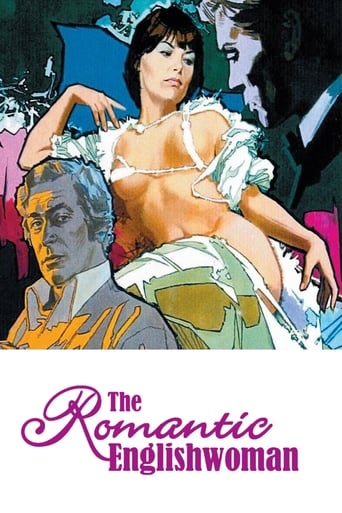

In the extremely strange and uninteresting The Romantic Englishwoman, a husband's suspicion of his wife's infidelity practically pushes her into doing it. The outline of the plot could have been turned into a comedy, but Tom Stoppard and Thomas Wiseman's script is a drama. As a result, there's really nothing and nobody in the film to really care about.Michael Caine and Glenda Jackson are the married couple, and every time she's out of his sight, he imagines that she's with another man—even though when they are together they can't keep their hands off each other and only get in small squabbles instead of real fights. Then, Helmut Berger appears, and even though he's a virtual stranger to Glenda, Michael can't help but practically push them together so that he can prove himself right. It's extremely silly, but not in a comical way. Unless you're a die-hard fan of Glenda Jackson and want to see her whip her clothes off in several scenes, I can't imagine anyone wanting to sit through this movie. The acting feels uninspired, the plot is beyond frustrating, and the characters are impossible to root for. Plus, Glenda Jackson always seems too angry to be likable.
... View MoreMy very first contact with Joseph Losey's canon is this film adapted from Thomas Wiseman's eponymous novel, the reason why I selected this one purely because of its cast, namely for Glenda Jackson, the two-times Oscar winner, whose work has eluded me until now, but the film itself turns out to be a very disappointing misfire.Speaking of the cast, Glenda Jackson has her charismatic dignity in almost every scene although regularly shoehorned between Berger's perpetual snug grin and Caine's perpetual sullen stare, and eventually cannot save the film from the mire of a psychological drama swamped with behavioral absurdities and non-consistent narrative. The fierce-looking wife with a bob cut and perfectly trimmed fringes, who is discontent with her middle-class lifestyle (her writer husband has immersed into the writer's block when writing a film script and becomes paranoid about her adultery in her solo trip to Baden-Baden), tries her luck to elope with a self-claimed German poet (whose real identity is only hinted by smuggling small-time drugs and cruising of elderly lonely-hearts), whom she has met before in Baden- Baden, but is there a fling between them in their previous encounter? The film never answer the question, a corny exploit being overused here. Richard Harley's lyrical string score has stolen the thunder since more often than not, I am very much a visual observer than a sonic perfectionist. Also I quite prefer the slowly panning camera in carefully constructing a hunter and prey game in the beginning part in Baden- Baden to the dreadful and ostentatious meandering in the labyrinth of feigned sentimentality, claiming inane quips like "Englishwoman is the most romantic" (Berger's German accent is a major buzz-killer), I hope someone else could be fortunate enough to fully digest all the hocus-pocus and be grateful towards this ill-fated film adaption.
... View MoreIs this the worst film ever made (not including Michael Winner's re-make of The Big Sleep which was almost a spoof)? It starts beautifully with Glenda Jackson looking out of a train window over Germany set to lovely music and then it's all downhill from here on in. Glenda Jackson looks stunningly beautiful but Wardrobe obviously had no idea how to dress her in anything that actually suited her, Michael Caine is rubbish as a jealous husband, no subtlety at all & even unsubtle characters require a certain subtlety of acting. He is wholly miscast as an intellectual & a creative type.Occasional flashes of style but the "plot" is muddled & aimless, the script poor, the direction & editing are an utter mess. The whole thing is very 1970s & very difficult to watch without cringing. What an utter waste of time. A hundred minutes of my life that I'll never get back.
... View MoreFrom the film's title and credits, I had assumed it would be a hysterical melodrama but, in general, I was pleasantly surprised by the result! As expected from this director, it's a stylish film but not an easy one: in fact, it's been likened to Alain Resnais' LAST YEAR AT MARIENBAD (1961) - though it's not quite that mystifying! Still, the plot does blur the confines which separate fact from fiction, especially in the way novelist/screenwriter Michael Caine bases the affair between a man and a woman who meet while on holiday in a foreign city - and which we see enacted from time to time - on the one he suspects went on between his wife (Glenda Jackson) and a young German gigolo (Helmut Berger) in Baden-Baden. The latter, however, is not as naïve and innocuous as he seems to be; apart from being a crook, when invited by Caine to England, he insinuates himself into the couple's household: charming the nanny who takes care of their child, intriguing the apprehensive Caine (playing a character named Lewis Fielding, whereupon Berger presents himself as an admirer citing "Tom Jones" as his favorite novel - actually written by Henry Fielding!) but who still makes him his secretary, while Jackson is annoyed and evidently uncomfortable with the whole tension-filled set-up.The three stars are excellent, but Caine's character is especially interesting; curiously enough, when presented with the idea for his script, he finds it boring and proposes to change it into a suspenser but, after realizing that the drama held greater resonance for him than he had anticipated, he is unaware of the parallel thriller subplot wherein Berger falls foul of his criminal associates (led by the smooth Michel Lonsdale)! The cast also features Rene' Kolldehoff (as Caine's extravagant producer), Nathalie Delon (severely underused, despite her "Guest Artist" credit) and Kate Nelligan (as a gossipmonger friend of the Fieldings).The script by Tom Stoppard and Thomas Wiseman (from the latter's novel) is actually very funny, particularly Caine's explosive put-down of Nelligan on her very first appearance (though when Jackson eventually leaves him for Berger, she goes to see how he's doing and they make up), a society dinner in which Caine ends up drunk and Delon is mistaken for a hooker and, again, Caine's close encounter with gangster Lonsdale. Here, Losey also does some interesting things with his camera (Gerry Fisher was the cinematographer) and Richard Hartley's score is notable, too.I've only watched this and MR. KLEIN (1976) from Losey's final period (1972-85), during which there were evident signs of decline; even if overlong and emerging, ultimately, as a lesser work, the film is more enjoyable - and rewarding - than could be gleaned from a mere reading of its synopsis...
... View More